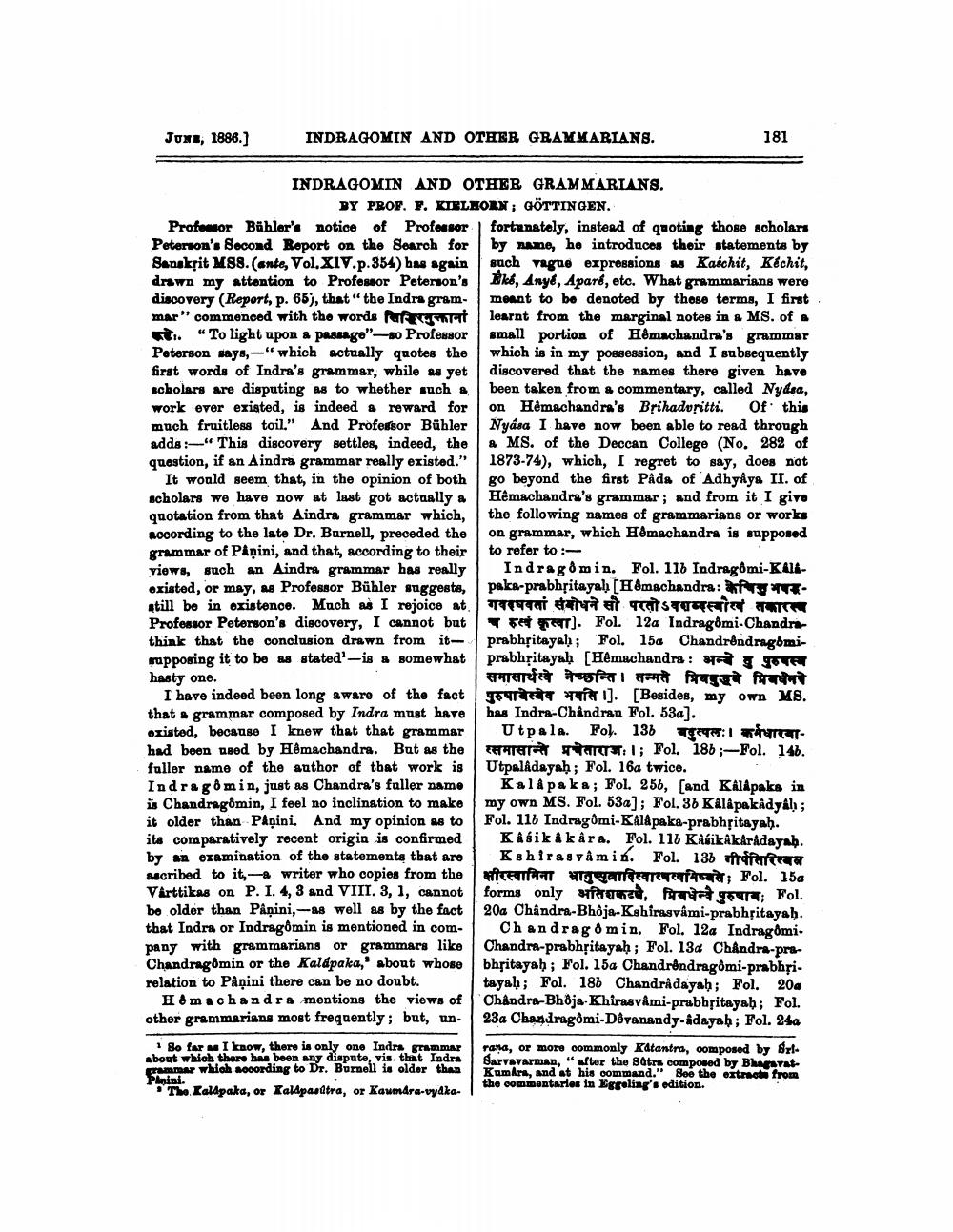________________
Jonz, 1886.]
INDRAGOMIN AND OTHER GRAMMARIANS.
181
INDRAGOMIN AND OTHER GRAMMARIANS.
BY PROF. F. KIELHOEN; GÖTTINGEN. Profowor Bählor's notice of Professor fortunately, instead of quoting those scholars Peterson's Second Report on the Search for by name, he introduces their statements by Sanskrit M88. (ante, Vol. XIV.p.354) has again such vagne expressions as Kaschit, Kéchit, drawn my attention to Professor Peterson's Bks, Anyé, Aparé, etc. What grammarians were discovery (Report, p. 65), that “the Indra gram- | meant to be denoted by these terms, I first mar" commenced with the words Parerat learnt from the marginal notes in a MS. of a
ati. "To light upon a passage"-50 Professor small portion of Hémachandra's grammar Peterson says, -" which actually quotes the which is in my possession, and I subsequently first words of Indra's grammar, while us yet discovered that the names there given have scholars are disputing as to whether such a been taken from a commentary, called Nydea, work ever exiated, is indeed a reward for on Hêmachandra's Brihadvritti. Of this much fruitless toil." And Professor Bühler Nyása I have now been able to read through adds :-" This discovery settles, indeed, the MS. of the Deccan College (No. 282 of question, if an Aindra grammar really existed." 1873-74), which, I regret to say, does not
It would seem that, in the opinion of both go beyond the first Pâda of Adhyâya II. of scholars we have now at last got actually a Hêmachandra's grammar; and from it I give quotation from that Aindra grammar which, the following names of grammarians or works according to the late Dr. Barnell, preceded the on grammar, which H&machandra is supposed grammar of Påņini, and that, according to their to refer to : views, such an Aindra grammar has really Indrag 8 min. Fol. 116 Indragômi-K 14existed, or may, as Professor Bühler suggests, paka-prabhsitayal [Hémachandra:
. still be in oxistence. Much as I rejoice at.
T
h at TOSTART TATO Professor Peterson's discovery, I cannot but FET ). Fol. 12a Indragomi-Chandra think that the conclusion drawn from it- prabhsitayal; Fol. 15a Chandrándragomisupposing it to be as stated'-is & somewhat prabhsitayaḥ [Hêmachandra: hasty one.
समासार्थवे नेच्छन्ति । सन्मते प्रिवदुबे मिवनये I have indeed been long aware of the fact Tora T 1). [Besides, my own M8. that * grammar composed by Indra must have has Indra-Chandran Fol. 53a). existed, because I knew that that grammar Utpala. Fol. 136 4:1 OThad been used by Hêmachandra. But as the water TT: 1; Fol. 18b;-Fol. 146. faller name of the author of that work is Utpaládayaḥ; Fol. 16a twice. Indragðmin, just as Chandra's faller name Kal & paka; Fol. 256, (and Kalapaks in is Chandragðmin, I feel no inclination to make my own MS. Fol. 53a); Fol. 36 Kâlâ pakadyah; it older than Påņini. And my opinion as to Fol. 116 Indragðmi-Kalapaka-prabhsitayah. ita comparatively recent origin is confirmed Kåsik & kåra. Fol. 116 KibikAkarádayah. by an examination of the statements that are Kshiras våmin. Fol. 136 free scribed to it, a writer who copies from the wife WTO wafacerea : Fol. 159 Värttikas on P. I. 4, 3 and VIII. 3, 1, cannot forms only forrad,
T ; Fol. be older than Påņini, -as well as by the fact 20a Chandra-Bhôja-Kshirasvâmi-prabhțitayah. that Indra or Indragồmin is mentioned in com- Chandrag 8 min. Fol. 12a Indragðmi. PADY with grammarians or grammars like Chandra-prabhțitayah ; Fol. 13a Chandra-preChandragðmin or the Kaldpaka,' about whose bhpitayah; Fol. 15a Chandrendragðmi-prabhri. relation to Panini there can be no doubt. tayah; Fol. 18b Chandrådayah; Fol. 20a
H&m chandra mentions the views of Chandra-Bhoja-Khirasvâmi-prabhsitayah; Fol. other grammarians most frequently; but, un. 23a Chandragðmi-Devanandy-adayah; Fol. 240
1 So far w I know, there is only one Indrs grammar about which there has been any dispute, vis. that Indra Tammar which according to Dr. Burnell is older than
The Ealdpaka, or kaldpardtra, or Kaumdra-vydka
rana, or more commonly Kdtantra, composed by SrlBarvavarman, " after the Satrs compoued by Bhagavat Kamera, and at his command." See the extrots from the commentaries in Eggaling's edition.
Plnini.




